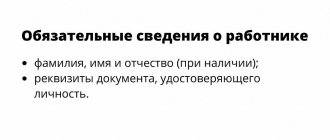New edition of Art. 192 Labor Code of the Russian Federation
For committing a disciplinary offense, that is, failure or improper performance by an employee through his fault of the labor duties assigned to him, the employer has the right to apply the following disciplinary sanctions:
1) remark;
2) reprimand;
3) dismissal for appropriate reasons.
Federal laws, charters and regulations on discipline (part five of Article 189 of this Code) may also provide for other disciplinary sanctions for certain categories of employees.
Disciplinary sanctions, in particular, include the dismissal of an employee on the grounds provided for in paragraphs 5, 6, 9 or 10 of part one of Article 81, paragraph 1 of Article 336 or Article 348.11 of this Code, as well as paragraph 7, 7.1 or 8 of part one of Article 81 of this Code Code in cases where guilty actions giving grounds for loss of confidence, or, accordingly, an immoral offense were committed by an employee at the place of work and in connection with the performance of his job duties.
The application of disciplinary sanctions not provided for by federal laws, charters and regulations on discipline is not permitted.
When imposing a disciplinary sanction, the severity of the offense committed and the circumstances under which it was committed must be taken into account.
What is the essence of labor discipline?
Each employer establishes a number of specific rules of labor discipline, which are reflected in documents such as:
- internal labor regulations;
- collective agreement;
- an employment contract with a specific employee;
- employee's job responsibilities;
- labor protection instructions;
- legal requirements and internal regulations.
The employee is obliged to comply with these rules (Article 21, 189 of the Labor Code of the Russian Federation), and the employer has the right to reward the employee for their conscientious compliance (Article 22, 191 of the Labor Code of the Russian Federation) and to punish for non-compliance or improper execution (Article 22, 192 of the Labor Code of the Russian Federation ).
To punish an employee, you need to establish:
- whether the disciplinary offense is among those for which punishment can be applied;
- whether all prerequisites for filing claims against the employee have been met;
- whether the documents establishing the rules of labor discipline are drawn up correctly.
An employer may exercise the right to punishment if:
- the fact that the employee is familiar with the rules of labor discipline is confirmed;
- the employee is guilty of a disciplinary offense;
- the fact of the existence of the offense is documented;
- the employee is given the opportunity to justify his misconduct;
- all rules established for the procedure for applying punishment have been observed.
The decision to apply punishment must be made by a person who has the right to do so, which is documented for him. It could be:
- an individual who is an employer;
- the head of the organization or another official authorized by him.
Only compliance by the employer with all the rules established for the procedure for applying punishment will give grounds to consider this punishment legal and will not entail negative consequences if the employee decides to challenge it.
For what offenses does an employer have the right to punish an employee?
A violation that fits into the concept of a disciplinary offense will be one that will be regarded as failure to fulfill or improper performance of labor duties by the employee, if this is his fault. For example, signs of disciplinary misconduct are present when an employee:
- is absent from the workplace specified in the employment contract for some time; At the same time, it must be borne in mind that absence from a place considered to be work may also be due to official needs;
- refuses to fulfill labor duties according to the changed labor standards, which are approved by the employer and of which the employee is notified;
- refuses to undergo mandatory procedures before being allowed to work (medical examination, training in equipment operation rules or safety exams);
- refuses to sign an agreement on full financial liability if the nature of his activity requires the conclusion of such an agreement, and he was notified of this;
- refuses to carry out a lawful order of the manager, despite an explanation to him of the unfoundedness of such a refusal and an indication of the possible consequences.
Depending on the employee’s previous behavior, the severity of the disciplinary offense, and the consequences resulting from it, the employer, after going through the mandatory procedure of documenting the violation, selects one of the disciplinary measures allowed by law, unless other measures of influence are provided for a specific category of employees (Article 192). Labor Code of the Russian Federation):
- comment;
- rebuke;
- dismissal.
At the same time, dismissal is considered a last resort and becomes permissible when serious disciplinary offenses are committed.
Read more about reprimand in the article “Reprimand as a disciplinary sanction (nuances).”
How is a penalty removed?
A penalty issued in the form of a reprimand or reprimand is lifted on one of 2 grounds (Article 194 of the Labor Code of the Russian Federation):
- Its validity period has expired (1 year from the date of imposition), provided that during this time the employee did not have any new violations. The collection is lifted automatically without any paperwork.
- Before the expiration date, if there is an initiative on the part of the employee, his immediate superior, the workforce or the employer’s manager. If the initiator is an employee, then he writes a statement addressed to the head of the employer, and if the immediate superior or work collective, a petition is drawn up. The removal of the penalty is formalized by order.
Read about the nuances of drawing up such an order in the article “Order to lift a disciplinary sanction - sample.”
What is included in the list of gross misconduct?
Gross disciplinary offenses, in some cases giving grounds for dismissal even for a single violation (Clause 6 of Article 81 of the Labor Code of the Russian Federation), are listed in Art. 81, paragraph 1, art. 336 and art. 348.11 Labor Code of the Russian Federation. This:
- repeated disciplinary offenses (clause 5 of Article 81);
- absenteeism, which is considered absence from the workplace throughout the entire working day or shift or for more than 4 hours in a row (subparagraph “a”, paragraph 6 of Article 81);
- appearing at the workplace in a state of alcoholic or other intoxication (subparagraph “b”, paragraph 6 of Article 81);
- disclosure of information related to state, commercial, official, personal or other secrets (subparagraph “c”, paragraph 6 of Article 81);
- destruction, damage or theft of someone else’s property, the fact of which is established by law (subparagraph “d”, paragraph 6 of Article 81);
- violation of labor protection requirements, which resulted in the emergence of a threat or the onset of serious consequences for people and property (subparagraph “e”, paragraph 6 of Article 81);
- the commission by a financially responsible person of actions that raise doubts about his honesty (clause 7 of Article 81);
- concealment by an employee of information about property belonging to his family, if this gives grounds for loss of confidence in him (clause 7.1 of Article 81);
- the teacher commits an immoral act (clause 8 of Article 81);
- adoption by a person who is among the leaders of an organization of a decision that resulted in material damage to it (clause 9 of Article 81);
- gross violation by a person who is among the leaders of the organization of his direct labor duties (clause 10 of article 81);
- not the first gross violation of the charter of an educational organization by a teaching employee in a year (clause 1 of Article 336);
- disqualification of an athlete or violation of anti-doping rules (Article 348.11).
What is the procedure for imposing and removing penalties?
Any disciplinary offense must be documented: a report from the immediate superior of the violator addressed to the head of the employer or an act of disciplinary offense, which is usually drawn up by personnel department employees, as well as other documents confirming the existence of a violation, or testimony of witnesses.
Before applying sanctions, the employer needs to request an explanation from the employee, which he must give within 2 days in any form (in writing). But the employee may refuse to give such explanations, and in this case, in the presence of witnesses, it is necessary to draw up a report on this.
If the fact of a disciplinary offense is indisputable (the employee’s guilt in violating labor duties has been established) and there are no circumstances justifying it (for example, disability, unforeseen circumstances, a call to law enforcement), then it becomes possible to impose a penalty. Moreover, even in the event of a serious violation, it is not necessary to resort to dismissal.
IMPORTANT! For one disciplinary offense there can be only one punishment (Article 193 of the Labor Code of the Russian Federation). It is reflected in the order, which, no later than 3 working days from the date of execution, is provided to the employee for review against signature. The latter’s refusal to sign the order is also documented in an act.
The penalty can be applied within 1 month from the date of detection of the disciplinary offense and no later than six months (and for financial violations - 2 years) from the date of its commission, taking into account the periods of absence from work allowed by law (Article 193 of the Labor Code of the Russian Federation).
Failure to comply with the procedure for imposing a penalty (documentation, sequence of steps, deadlines), especially in the case of dismissal, may lead to its recognition as illegal.
A disciplinary sanction is automatically lifted after a year in the absence of a new disciplinary offense (Article 194 of the Labor Code of the Russian Federation). But early withdrawal is also allowed on the initiative of:
- employer's manuals;
- the employee's immediate supervisor;
- labor collective;
- the employee himself.
In relation to the removal of punishment, an order is also issued, which serves as the basis for a corresponding entry in the employee’s personnel documents.
For information about what personnel documents need to be prepared for each hired employee, read the article “Personnel documents that must be in the organization.”
What is not considered truancy?
The following are not considered absenteeism:
- days of rest on the basis of a vacation order (form form No. T-6);
- being on sick leave (if specific dates are indicated on the certificate of incapacity for work received in a municipal or private clinic, certified by the signature of the chief physician and the seal of the medical institution);
- time spent on a business trip (if there is an order in form No. T-9 or T-9a, certificate No. T-10, official assignment and report in form No. T-10a);
- stay on maternity leave on the basis of a sick leave certificate, a certificate of registration in the housing complex until the 12th week of pregnancy and the corresponding order for maternity leave, drawn up on the unified form No. T-6.
For valid reasons for absence from work. place according to Art. 142, 170, 186, 414 of the Labor Code of the Russian Federation and judicial practice include:
- blood donation, including with medical examinations;
- being in a pre-trial detention center;
- participation in workers' strikes;
- Emergency situations and force majeure circumstances;
- being on leave without pay, approved by management (provided the employee complies with all formal procedures);
- suspension of an employee’s activities due to a delay in salary for a period of more than 15 days after notifying the employer in writing;
- child care during the husband/wife's hospitalization. At the same time, the husband/wife being treated in a hospital setting is not a valid reason;
- execution of state or public duties;
- work remotely in agreement with the employer.
If an employer fires an employee who is on vacation, sick leave, business trip, or for other valid reasons, he may have problems at the first inspection.
A dissatisfied employee has the right to file a complaint with the State Labor Inspectorate, the prosecutor's office, the court, and also enlist the support of a trade union. The law is on his side in such cases. The employer, in turn, will not only incur temporary, reputational and material costs, but will also be forced to reinstate the employee who was fired for “absenteeism” unlawfully. Moreover, the victim will have to pay compensation in the form of salary for the entire period of dismissal (the so-called “forced absenteeism”) on the basis of Art. 394 Labor Code of the Russian Federation.
When can a separate punishment be applied for each offense?
If the employee continues to commit offenses, he may be punished separately for each of the disciplinary offenses he has committed (and it is permissible to apply new types of punishments up to and including dismissal) in the following cases:
- a continuing violation, i.e. when an employee continues to commit a disciplinary offense for which he is punished, and it is obvious that the first punishment did not help;
- periodic violations similar to the violation for which the employee has already been punished;
- committing a new type of disciplinary offense.
When is punishment illegal?
The punishment may be considered illegal if:
- the employee’s guilt in a disciplinary offense is absent, is not related to labor functions or has not been proven;
- there is no written confirmation of the fact that the employee timely familiarized himself (on receipt) with local acts establishing the rules of labor discipline and the list of job responsibilities;
- in local acts there is no record of their coordination with a trade union organization or that such an organization has not been created;
- an explanatory note regarding a disciplinary offense was requested from the employee after a penalty was imposed on him;
- the set of documents substantiating the fact of a disciplinary offense is incomplete;
- the decision to collect was made by a person who is not authorized to do so;
- the deadlines for completing documents related to a disciplinary offense or making a decision on punishment were not met.
The procedure for applying disciplinary liability
The exercise of the employer's right to bring an employee to disciplinary liability will be possible only if several preconditions are met:
- The rules of labor discipline are drawn up in accordance with all the necessary requirements: approved by the manager, they indicate the date of approval, they are agreed upon with the trade union organization or have a note that such an organization was not created.
- Before committing a disciplinary offense, the employee is familiar with all the rules of labor discipline, and his signature certifying the fact of this acquaintance is available along with the date of acquaintance with the document, which he personally affixed.
Another important condition is that the employee is guilty of the offense (Article 192 of the Labor Code of the Russian Federation). He cannot be punished if his fault:
- absent;
- not related to work duties;
- not proven.










